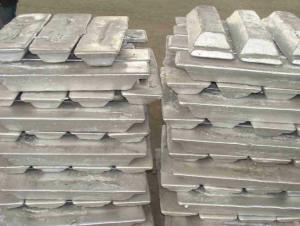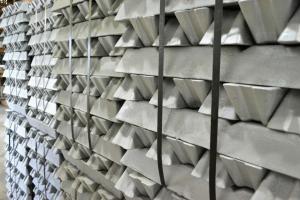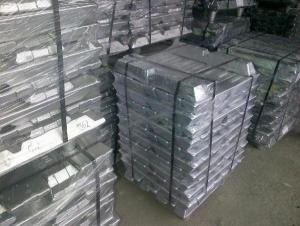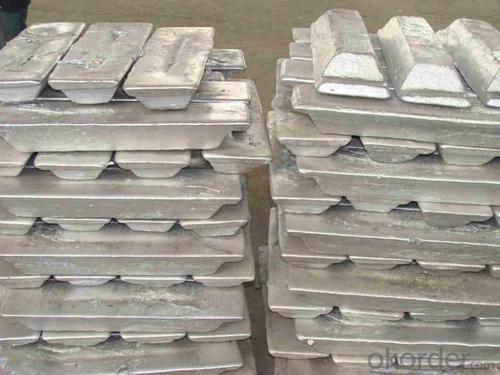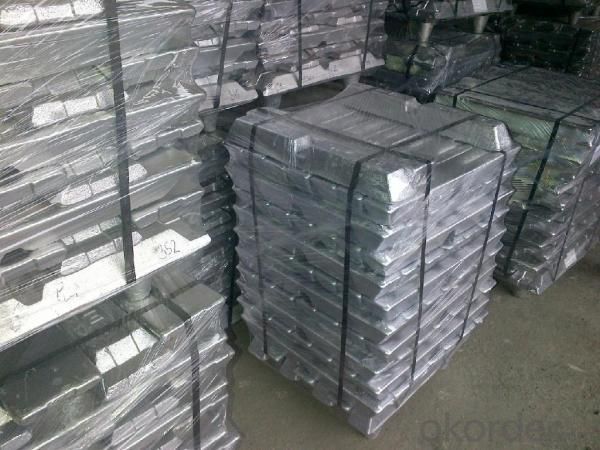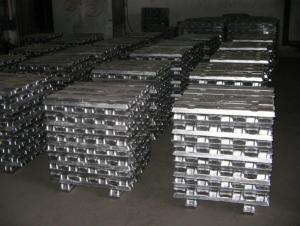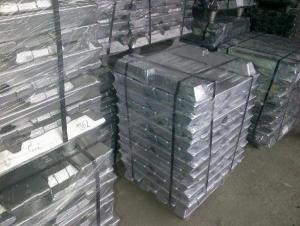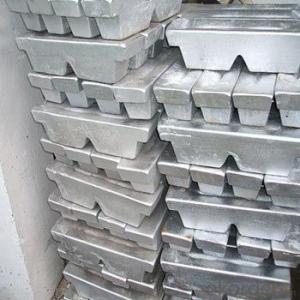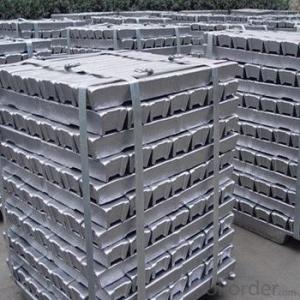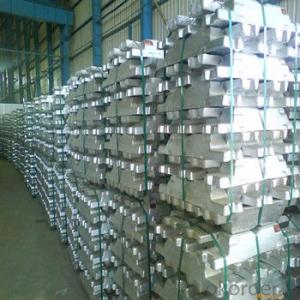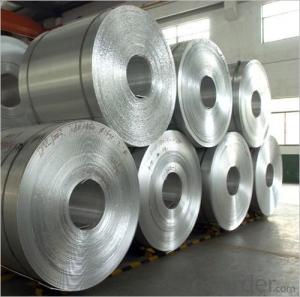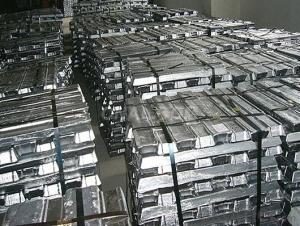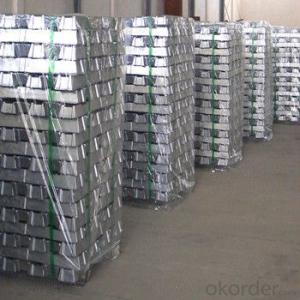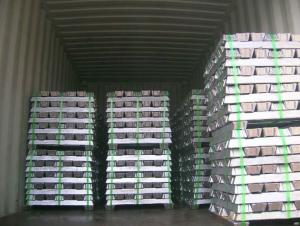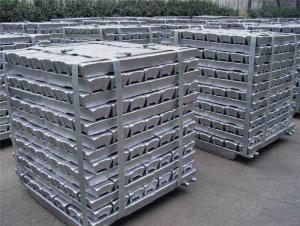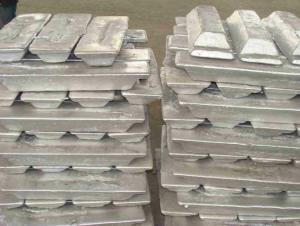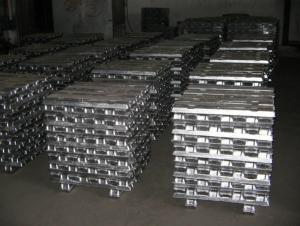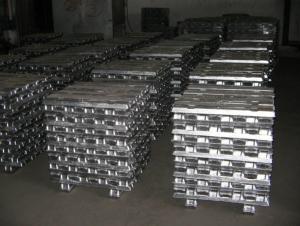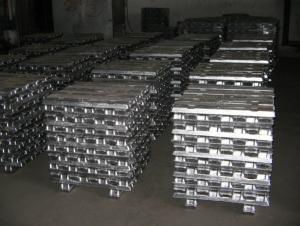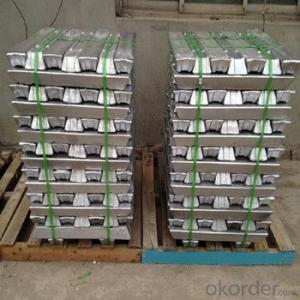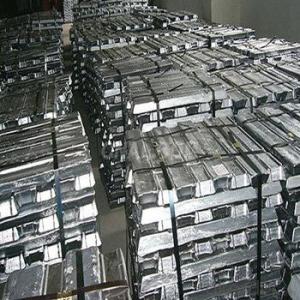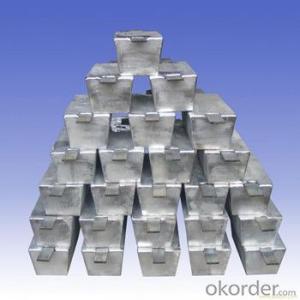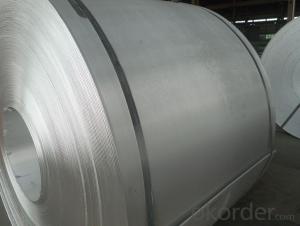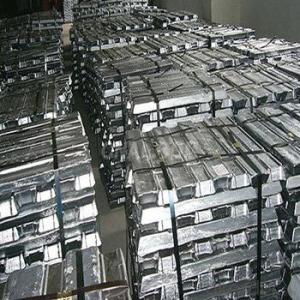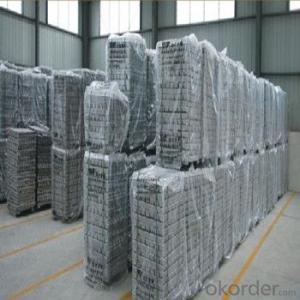Aluminum Ingots AA3004
- Loading Port:
- Shanghai
- Payment Terms:
- TT or LC
- Min Order Qty:
- 20 Tons m.t.
- Supply Capability:
- 1000 Sets Per Month m.t./month
OKorder Service Pledge
OKorder Financial Service
You Might Also Like
1. Specifications of Aluminum Ingots AA3004
Product Name | Aluminum Ingot |
Chemical Composition | Al |
Weight | 20/25kg |
Al (Min) | 99%-99.9% |
Appearance | silvery white |
Advantages | easy control and operation, fast melting |
Chemical composition of Aluminum Ingots AA3004
Grade | Chemical Composition % | |||||||||
Al≥ | Si | Fe | Cu | Ga | Mg | Zn | Mn | others | Sum | |
Al99.9 | 99.90 | 0.50 | 0.07 | 0.005 | 0.02 | 0.01 | 0.025 | - | 0.010 | 0.10 |
Al99.85 | 99.85 | 0.80 | 0.12 | 0.005 | 0.03 | 0.02 | 0.030 | - | 0.015 | 0.15 |
Al99.7 | 99.70 | 0.10 | 0.20 | 0.010 | 0.03 | 0.02 | 0.030 | - | 0.030 | 0.30 |
Al99.6 | 99.60 | 0.16 | 0.25 | 0.010 | 0.03 | 0.03 | 0.030 | - | 0.030 | 0.40 |
Al99.5 | 99.50 | 0.22 | 0.30 | 0.020 | 0.03 | 0.05 | 0.050 | - | 0.030 | 0.50 |
Al99.00 | 99.00 | 0.42 | 0.50 | 0.020 | 0.03 | 0.05 | 0.050 | - | 0.050 | 1.00 |
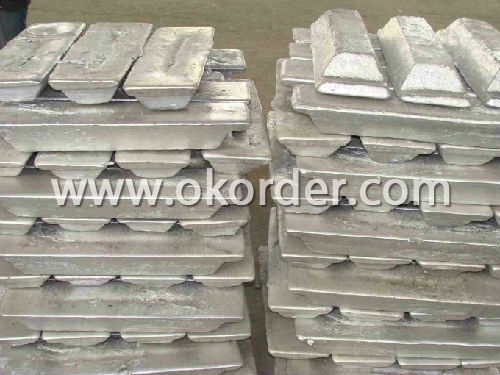
2. Usage/Application of Aluminum Ingots AA3004
1. mainly used for melting ingot
2. discontinuous melting with scrap
3. easy control and operation
4. fast melting
5. Used for industry such as automobile,pinning and weaving,electron broadly and so on
3.Packaging & Delivery of Aluminum Ingots AA3003
About 25Kg /Ingot, Packed in wooden case, Net weight 1000Kg/ Case, or as customer's requirements.
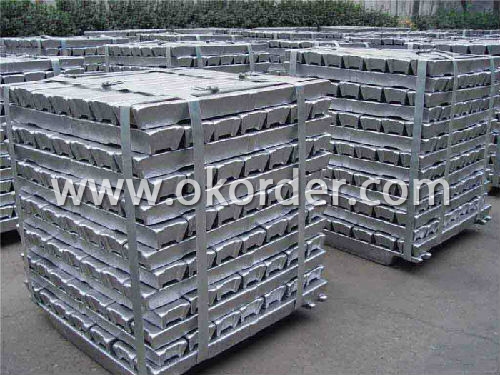
- Q: What are the different forging techniques for aluminum ingots?
- Some of the different forging techniques for aluminum ingots include open-die forging, closed-die forging, and ring rolling. In open-die forging, the aluminum ingot is placed between two flat dies and compressed to shape it. Closed-die forging involves using shaped dies to create intricate and precise shapes. Ring rolling is a specialized technique where the ingot is rolled into a ring shape using radial and axial forces. These techniques allow for the production of a wide range of aluminum products with varying shapes and sizes.
- Q: How are aluminum ingots used in the production of marine vessels?
- The production of marine vessels heavily relies on aluminum ingots, which fulfill a crucial role. These ingots serve as the primary raw material for constructing different components and structures of the vessel, including the hull, superstructure, and other parts. The outstanding strength-to-weight ratio of aluminum ingots is one of the main reasons why they are preferred for marine vessel production. Being a lightweight metal, aluminum offers exceptional structural integrity, making it an ideal choice for building durable and agile vessels. Shipbuilders can utilize aluminum ingots to create robust and fuel-efficient vessels, resulting in improved performance and reduced operating costs. Additionally, aluminum ingots possess a high resistance to corrosion, which is a significant advantage in the marine environment. Traditional steel vessels are prone to severe corrosion caused by saltwater and harsh weather conditions, leading to maintenance issues and a shortened lifespan. The natural corrosion resistance of aluminum minimizes the need for extensive maintenance, ensuring the longevity of the vessel. Moreover, aluminum ingots are easy to work with and offer excellent formability. Shipbuilders can mold, bend, weld, and shape them into intricate designs required for marine vessel production. This flexibility allows for the creation of complex structures and optimization of the vessel's overall design, enhancing both performance and aesthetics. Furthermore, the use of aluminum ingots in marine vessel construction contributes to sustainability efforts. Aluminum is a highly recyclable material, and incorporating recycled aluminum in the production process significantly reduces energy consumption and greenhouse gas emissions. This aligns with the increasing emphasis on eco-friendly practices in the maritime industry. In conclusion, aluminum ingots are an indispensable component of the marine vessel production process. Their lightweight nature, strength, corrosion resistance, formability, and recyclability make them an excellent choice for constructing vessels that are efficient and sustainable.
- Q: How to refine aluminum ingot
- You need a basic open hearth is heating aluminum cans, but is not the direct melting aluminum ingot what meaning, that thing in a lot of impurities, but also remove the magnesium, zinc, manganese and other elements, these processes need professional personnel, so difficult to master.
- Q: What is the current market price of aluminum ingots?
- The current market price of aluminum ingots is subject to change and may vary depending on factors such as supply and demand, global economic conditions, and market fluctuations. To obtain the most accurate and up-to-date information on the current market price of aluminum ingots, it is recommended to consult reputable financial news platforms, commodity exchanges, or industry reports.
- Q: What are the benefits of using aluminum ingots in the construction of lightweight structures?
- There are several benefits of using aluminum ingots in the construction of lightweight structures. Firstly, aluminum is a lightweight metal, making it an ideal choice for constructing lightweight structures. It has a density that is approximately one-third of steel, allowing for the creation of structures that are significantly lighter in weight. This is particularly advantageous in industries such as aerospace, automotive, and marine, where reducing weight is crucial for improving fuel efficiency and overall performance. Secondly, aluminum is highly corrosion-resistant. Unlike other metals, such as steel, aluminum does not rust when exposed to moisture or other corrosive elements. This makes it an excellent choice for structures that are exposed to harsh environmental conditions, such as buildings near the coast or in areas with high humidity. By using aluminum ingots, the structures can withstand corrosion, ensuring their longevity and reducing maintenance costs. Furthermore, aluminum is a highly malleable material, allowing for greater design flexibility. It can be easily shaped and formed into various complex geometries, enabling architects and engineers to create innovative and aesthetically pleasing structures. This versatility in design also allows for efficient use of materials, reducing waste and maximizing the structural integrity of the lightweight construction. Another significant benefit of using aluminum ingots is their excellent strength-to-weight ratio. Despite being lightweight, aluminum structures can still possess impressive strength and durability. This makes them suitable for applications where both strength and weight reduction are essential, such as in the construction of aircraft, high-rise buildings, and bridges. Additionally, aluminum is a sustainable material as it is highly recyclable. It can be melted down and reprocessed repeatedly without losing its properties, making it an environmentally friendly choice. By using aluminum ingots, construction projects can contribute to the circular economy and reduce the demand for new raw materials. In conclusion, the use of aluminum ingots in the construction of lightweight structures offers numerous benefits. These include reduced weight, corrosion resistance, design flexibility, excellent strength-to-weight ratio, and sustainability. Incorporating aluminum into construction projects can lead to improved performance, increased efficiency, and reduced environmental impact.
- Q: What are the advantages of the CNC process for aluminum and die cast aluminum?
- The main properties, namely strength, hardness and wear resistance, are in accordance with the national standard GB6063. The utility model has the advantages of light weight, only 2.8, no rust, fast design change, low die input and longitudinal elongation up to more than 10 meters. There is light, matte of aluminum processing appearance, the process of anodic oxidation treatment, surface treatment of oxide film thickness reaches 0.12m/m. The wall thickness of aluminum profile is chosen according to the optimization of product design. The thicker the market is, the better the design of sectional structure should be. It can be uneven in 0.5~5mm. Layman thinks that the thicker and tougher, it is the wrong view.
- Q: 102 non-standard aluminum ingot is like? And ordinary non-standard aluminum ingot what is the difference?
- Ordinary non-standard aluminum ingot is the tube you use, regardless of your standard, with miscellaneous aluminum recovery smelting out of the aluminum ingot.
- Q: Can aluminum ingots be used in 3D printing?
- Yes, aluminum ingots can be used in 3D printing. Aluminum is a commonly used material in additive manufacturing processes such as selective laser melting (SLM) or direct metal laser sintering (DMLS). By melting the aluminum ingots and layering it in a precise manner, it is possible to create complex and durable 3D printed metal parts.
- Q: Can aluminum ingots be used in medical applications?
- Yes, aluminum ingots can be used in certain medical applications. Aluminum is lightweight, non-toxic, and has excellent corrosion resistance, making it suitable for medical devices such as orthopedic implants, prosthetics, and surgical instruments. However, it is important to note that aluminum should meet specific medical grade standards to ensure its safety and compatibility with biological systems.
- Q: How can the pop top smelting be purified after the aluminium ingot is smelted?Then sell aluminum ingot raw material suitable?
- Because the cans of printing, transportation, recycling process, there will be a lot of impurities, so to purify
1. Manufacturer Overview
| Location | Henan,China |
| Year Established | 1993 |
| Annual Output Value | Above US$200 Million |
| Main Markets | Mid East;Eastern Europe;North America |
| Company Certifications | ISO 9001:2000;ISO 14001:2004;OHSAS 18001 |
2. Manufacturer Certificates
| a) Certification Name | |
| Range | |
| Reference | |
| Validity Period |
3. Manufacturer Capability
| a) Trade Capacity | |
| Nearest Port | Shanghai |
| Export Percentage | 30%-50% |
| No.of Employees in Trade Department | 21-50 People |
| Language Spoken: | English;Chinese |
| b) Factory Information | |
| Factory Size: | Above 100,000 square meters |
| No. of Production Lines | Above 10 |
| Contract Manufacturing | OEM Service Offered;Design Service Offered |
| Product Price Range | Average |
Send your message to us
Aluminum Ingots AA3004
- Loading Port:
- Shanghai
- Payment Terms:
- TT or LC
- Min Order Qty:
- 20 Tons m.t.
- Supply Capability:
- 1000 Sets Per Month m.t./month
OKorder Service Pledge
OKorder Financial Service
Similar products
Hot products
Hot Searches
Related keywords
